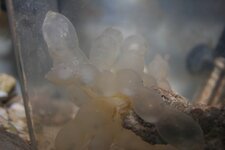- Joined
- Oct 3, 2006
- Messages
- 14
I found a cluster of eggs under a rock while I was SCUBA diving. I live in South Florida and am currently a PHD canidate, for Invertabrate Zoology. While doing research for school I found this cluster of eggs under a rock and decieded to collect a few. There was probabley 300 or more eggs and I took about 100. This was a month ago and today the first little guy hatched. The Scientist in me divided them up into three seperate tanks one at 74 degrees one at 78 and one at 82. As projected the development of the eggs in the warmer water is faster. I think I have Identified them as Briareus but I am not sure being that they are 5mm long. This is just my guess based on the size of the eggs and the location I found them. Any tips on what to feed them What they are, and how to care for them is greatly appreciated.

